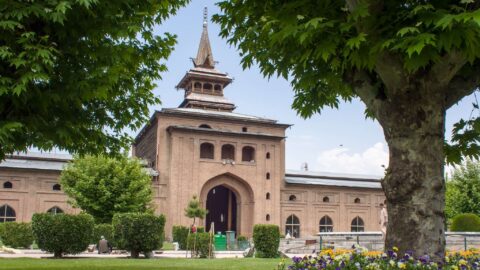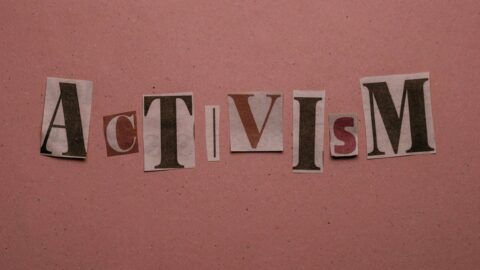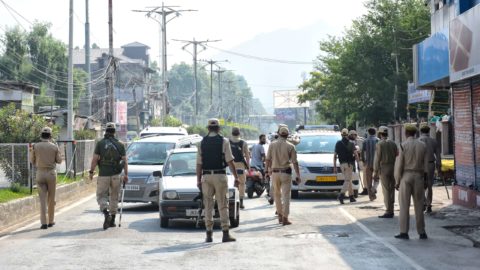The passage of India’s new Waqf Act has spotlighted the growing vulnerability of Muslim religious…
What if Kashmiris Could No Longer Dream?
First published at English Language Notes, Kashmiri Futures 61(2): 15–18. Copyright 2023, Regents of the University of Colorado. All rights reserved. Published with permission from the author.
Written by Ather Zia
I SEE THE DEAD BODY of the young boy in my head. After the word got out that he had begun dreaming the military arrested and disappeared him. His body was found in the riverbed. The water had long dried. Yet a stone was tied to his belly, and his eyes had been gouged out.
Dreaming was declared to be a crime in Kashmir.
Every child from the age of 5 weeks must take medication to stop dreams. Originally used for treating nightmares, the medicine was used on Kashmiris to ensure they lost the faculty of dreaming completely. Those who might still dream must go through rigorous hypnotic therapy and counseling. Many people turned mad. Dreaming is a thing of the past.
I still remember my counseling days. The Indian doctor told me that dreaming among Kashmiris was as dangerous as cancer. It tended to metastasize out of control. I was a tough one. I kept dreaming for a long time. Jailed and tortured, ultimately, all I could do to stop dreaming was to stop sleeping. Can anyone survive not sleeping, I wonder?
✽
I SEE PEOPLE IN long queues in hospitals and clinics. All Kashmiris get a peculiar headache. We call it kanni kalleh (stone head). People sleep dreamlessly, waking up in the morning feeling as if their head is stuffed with stones. The international medical community recognizes it as Kashmiri syndrome and has developed an expensive medication that does a brisk business in Kashmir.
If the word got out that Rosy, Shafiq and Haleema’s 16-year-old daughter was dreaming, she would be killed, too, like the boy and many others.
✽
I SEE SHAFIQ AND Haleema leave Rosy in a dugout. It is carved into a hillside that is behind a dense swathe of old pines sprawled more than two kilometers around. A complete wilderness surrounds the hideout, and it is very hard to spot.
They kept water and some fruits and bread to last Rosy a few days. Thinking about returning in a few days to check on her, the couple walks back carefully between the tightly growing pines.
Closer to habitation, the dogs begin barking. They see soldiers and fear being stopped and asked why they were out so late. But the patrol keep walking.
From what I know, alongside fear, they feel somewhat victorious. As we all have felt over the years when dreams come, but even more when we get away with dreaming.
✽
I SEE SHAFIQ AND Haleema visit Az mouj early in the morning. The birds aren’t up yet. Az mouj is well known across the villages for her wisdom. Her pheran is too long. It was never meant to go beyond the ankles but that is what the military demands. The length of the robe keeps people from moving freely. And while it seems that the octogenarian Az mouj might trip, she crosses the room nimbly and sits down gracefully, all while bringing her jajeer in one hand. A feat of resilience, considering the constraints.
She begins smoking even before greeting the couple.
I see the jajeer, maybe the only relic left as it was shaped in the past.
The past, as you may have noticed by now, is placed the highest in our hearts. If our heart was the pyramid, our memory is the apex.
Az mouj listens carefully to the couple while puffing at the pipe. Her nostrils flare delicately as the smoke escapes her.
They finished the conversation, which was marked by Az mouj reaching out to put her hand on the couple’s head one by one.
They look at the sky and whisper together, “fabi ayi ala yi rabi kumatu kaziban.”
I see that they still remember. I see their smiles.
They haven’t heard the Azaan in years, but they remember their prayers.
Az mouj gives the couple two dates, withered and dry beyond recognition: “Take these to her. These are from the tabruk from my great-grandmother. Make sure she puts the pits in the pot there.”
Dates are not available in Kashmir and people have forgotten how they taste.
✽
I SEE ROSY’S FACE is flushed, but she is not crying.
She has not eaten much in the past three days. Her parents would be visiting her anytime now. After dark most likely.
The night is cool and quiet. There is no sign of spring.
Rosy turns her attention to the loose plank on the floor. She had felt it underneath the hay covered by an old reed mat. The opening led to a room-sized shaft under the floor. Molten wax most likely from candles was stuck to the walls, which were lined with books. There were pens and notebooks; some empty and some with filled pages. She wondered who wrote in them and what was written?
This was the first time in her life she saw books and writing tools so close. It was only the people from across the mountain who occupied their homeland who possessed books, paper, and pens. Rosy was excited to scribble something, maybe make a sunflower, but the fear of punishment was too much. It would take some time.
✽
I SEE ROSY SMILE in sleep.
She is dreaming of Khursheed and her gliding over the lake that has dried long ago in a shikara named Jannat (Heaven). [6] Her dream is full of lotuses nodding in the morning light. None of the Kashmiris alive have seen a lotus. They have heard stories that they are not allowed to share, but they still do in secret. No one remembers the lake. In the dream, Rosy and Khursheed are not indentured workers in the guava orchard but free young lovers. They are frolicking amid stumps of old apple trees that have remained in places that they saw many times in real life. In Rosy’s dream, Khursheed shows her a palm full of black seeds that look like eyes. “We will plant apples again,” she hears him say as the dream fades.
✽
I SEE ROSY WAKE up.
She is still smiling from the dream. When they first met and exchanged shy smiles, Khursheed had given Rosy a few guavas to take home. She saw that the tips of his fingers were blackened. It did not look like soil and dirt but something shinier, like a color. She meant to ask him what it was but was too shy. Rosy thought his eyes were the kindest she had ever seen.
At home, Haleema had thrown the guavas out of the window. “Never bring this damned fruit close to me,” she yelled. She said the guavas smelled like a zoo. Even though neither she nor Rosy had ever seen apples, they craved them. Legend had it that they tasted like the sweetest honey and smelled like crisp winter air.
Growing apples had been banned years back, only guavas were allowed. No one in Kashmir had any affinity for guava, maybe that is why it was imposed on them. The guava trees had never taken in the climate. Even after years of cultivation, the crop was always poor and left people even poorer. But they could not complain.
✽
I SEE SHAFIQ GETTING a change of clothes for Rosy. Haleema is preparing her a few meals and kahweh. She decided to use the last bits from a stash that came from her grandmother. Her heart broke when she saw the red stamens dissipate into the boiling water. She would never hold saffron in her palm again. Saffron was not allowed to grow in Kashmir. It was only known as a dreaded color associated with tyrants from across the mountain.
✽
I SEE SHAFIQ AND Haleema in the dugout.
They hug Rosy for a long time. Rosy looked weak but was holding up well for a child of 16 who was alone in the wilderness. She looked purposeful, like she had understood the task before her.
Shafiq told her to use the pen and notebooks but to make sure she hid them properly afterward. Rosy did not know much about reading and writing, but she was curious. All they had been taught was to write their names on official papers. This, too, was done with the help of a government official who would handle the writing tools.
Shafiq and Haleema listened quietly to the dreams Rosy had since they last met. They handed her the two dates from Az mouj.
Later when Rosy finished eating the dates, she went down into the shaft looking for the box to put the pits in. She found many boxes filled to the brim with pits. She added her two to it, thinking about others in this very place.
✽
I SEE ROSY LOOKING at the picture of the sunflowers she drew. They looked nothing like the flower. She tried for a long time, drawing with the black pen. When she finally got a proper shape together, she felt elated. Rosy saw the tips of her fingers that had blackened. It was not dirt but a shinier color from the pen. She remembered Khursheed’s hands. Her heart raced, and she felt all fear draining from her body.





